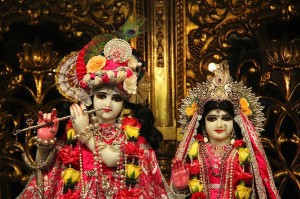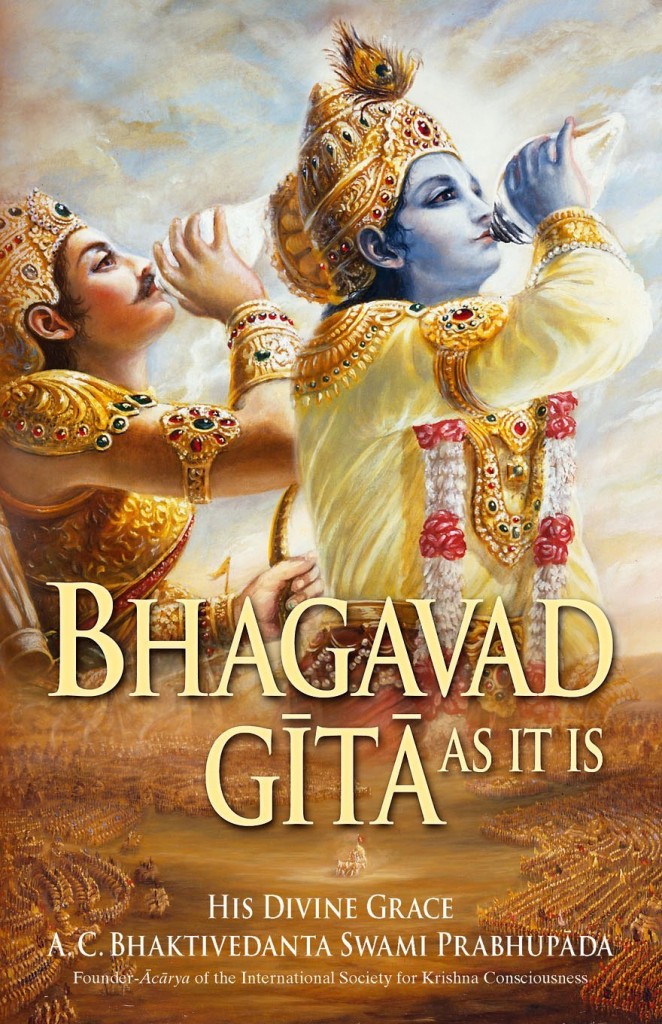Question: In verse 35 of chapter 3 of the Gītā, Krishna says to stick to one’s own duties and not be whimsical. Does this mean that you have to abide by Varnashrama Dharma? I am supposed to be a Brahmin by birth but I am just a businessman or even worse, a Sudra by actions. Will Varshanshrama Dharma differ in the Chatur yugas because these days it is very difficult practising a Brahmin lifestyle?
My Reply: Varnaśrama Dharma is not fully viable in this modern age, Kali-yuga. The only completely viable dharma in this yuga is hari-nāma-saṅkīrtana. (“harer nāma harer nāma harer nāmaiva kevalam, kalau nastyeva nastyeva nastyeva gatir anyataḥ”).
That said, Varnāśrama Dharma is still partially viable – and the general principles are still useful and valid. The Gita’s concept of Varnāśrama Dharma is not a janma (birthright) system at all, it is a guṇa-karma system (“catur-varnyam mayā śṛṣtāṁ guṇa-karma-vibhāgasa”) – a system based on your actual character and deeds. You are born into a brahmin family, but that does not mean that you have brahmin dharma, it means that it might be relatively easier for you to adopt brahminical occupations and character traits. But until and unless you adopt the deeds and character of a brahmana you are not a brahmana, instead you are “brahma-bandhu” (the relative of a brahmana). Of course, the caste system has degraded so extensively that most likely a person born into a so-called brahmin family today could often be brahma-bandhu-bandhu-bandhu-bandhu (the relative of a relative of a relative of a relative of a brahmana).
In kali-yuga, Varṇāśrama Dharma is not primary, it is secondary. Hari Kīrtana is primary. As a secondary dharma, the specific exact details and strictures of Varṇāśrama are not important, it is mainly the essential concepts and fundamentals of the system that are still reasonably viable today. Perhaps in the future things could possibly change for a few centuries or so, enabling Varṇāśrama to be a little more viable than it currently is. Currently the only useful thing is to recognize ones character and deeds as being most akin to either intellectual, administrative, mercantile, or artisan. And based on that, cultivate a few essential qualities intrinsic to each category. For example one with a primary intellectual bent needs to cultivate simplicity and honesty. One with a primary administrative bent needs to cultivate political knowledge and respect for intellectuals. One with a primary mercantile bent needs to cultivate the knowledge related to their field and the giving of ample charity, and one with an artisan bent needs simply cultivate their art/technical field along with the quality of helpfulness when called upon.
Krishna’s advice here in the 3rd Chapter of Gītā is translated to modern terms with more integrity when we use the word “responsibilities” rather than “duties” especially if by duties we begin thinking of some particular social structure like the caste system or some semi-workable concept of Varṇāśrama Dharma. He is advising Arjuna, “you have your responsibilities. Stick to them. Sticking to your responsibilities is always noble and pure and will always uplift your character and your life. Even when your responsibilities seem to be hard, or seem to be debased and difficult – stick to them at all costs.”
– Vraja Kishor das
www.vrajakishor.com



















 We have been serving delicious vegetarian karma-free meals in Melbourne since the 1971. Over three decades we have grown to cater to the various needs of Melbournites and visitors. We have two restaurants down-town, we serve meals three times a day from our temple premises in Albert Park, and we have an outreach program for the homeless and needy. We also cater for private functions and for festivals and events in and around Victoria.
We have been serving delicious vegetarian karma-free meals in Melbourne since the 1971. Over three decades we have grown to cater to the various needs of Melbournites and visitors. We have two restaurants down-town, we serve meals three times a day from our temple premises in Albert Park, and we have an outreach program for the homeless and needy. We also cater for private functions and for festivals and events in and around Victoria.  So, on March 3rd about one hour before the Maha abhisekha of the Panca tattva I made my way to the temple and pushed through thousands of devotees making my way to the front where there was a spot for Srila Prabhupada disciples. As time went past I spoke to Nrsingha kavacha who was ‘in charge’ of the Abhisekha and asked him what was the chance of making getting on the altar to bathe the Deities. He said, ‘None!’ We had a conversation for about 10 minutes and despite me using all of my strategies he didn’t budge. I told him that if I got the dhoti from Lord Caitanya or Lord Nityananda I would be somewhat pacified.
So, on March 3rd about one hour before the Maha abhisekha of the Panca tattva I made my way to the temple and pushed through thousands of devotees making my way to the front where there was a spot for Srila Prabhupada disciples. As time went past I spoke to Nrsingha kavacha who was ‘in charge’ of the Abhisekha and asked him what was the chance of making getting on the altar to bathe the Deities. He said, ‘None!’ We had a conversation for about 10 minutes and despite me using all of my strategies he didn’t budge. I told him that if I got the dhoti from Lord Caitanya or Lord Nityananda I would be somewhat pacified.  Vaishnava seva dasa prabhu from the most useful Iskcon website Iskcondesiretree.net just finished uploading them and they are ALL now available for watching and downloading (for free)
Vaishnava seva dasa prabhu from the most useful Iskcon website Iskcondesiretree.net just finished uploading them and they are ALL now available for watching and downloading (for free) 
 Dallas Morning News,
Dallas Morning News,
 In an American history we had slavery because it was said that dark-skinned people did not have souls. But where is the logic in that? By simple analysis one can see that the symptom of the soul or self is consciousness. As soon as the soul leaves the body, that body no longer carries its beauty and luster. That same symptom of consciousness is equal whether one is a man or a woman, dark-skinned or light, or human or animal. All feel pain and pleasure. However, because our society’s understanding of the self and consciousness is lacking depth, a large foolish section of society makes claims that animals are without souls and therefore without inherent rights.
In an American history we had slavery because it was said that dark-skinned people did not have souls. But where is the logic in that? By simple analysis one can see that the symptom of the soul or self is consciousness. As soon as the soul leaves the body, that body no longer carries its beauty and luster. That same symptom of consciousness is equal whether one is a man or a woman, dark-skinned or light, or human or animal. All feel pain and pleasure. However, because our society’s understanding of the self and consciousness is lacking depth, a large foolish section of society makes claims that animals are without souls and therefore without inherent rights.




 Devotees express their gratitude for the teachings and guidance that have received from Bhurijan prabhu who is acting as the representative of the Parampara for his disciples.
Devotees express their gratitude for the teachings and guidance that have received from Bhurijan prabhu who is acting as the representative of the Parampara for his disciples. 

